Outstanding SEND provision: Ofsted Inspection Analysis

This blog is based on Judicium’s Safeguarding ‘Sofa Session’ from the 25th of September, with our resident expert Rik Chilvers. This session focused on what areas Ofsted consider when inspecting SEND provision, what makes provision 'outstanding’, and early strategic goals for the 2024/25 academic year.
Last year Rik ran a session titled: What do Ofsted Look for when Inspecting for SEND Provision and Leadership? This blog now picks up where that one left off by expanding on our advice around what Ofsted look for when inspecting SEND provision with analysis of reports from schools judged to be Outstanding or Inadequate.
Changes to Ofsted inspections
We're all aware that Ofsted have now scrapped their one-word judgements of schools going forward. This is a hugely welcome change and we at Judicium are looking forward to seeing more detail on Ofsted's School Report Cards that are due for introduction from next year.
This blog draws on analysis of inspections made when single word judgements were in place; as such, we’ll be using the language of 'outstanding' and 'inadequate' throughout.
Needless to say, all of the data being discussed today is anonymised. The goal is to learn from the patterns we find, not to single out individual schools.
Poll 1
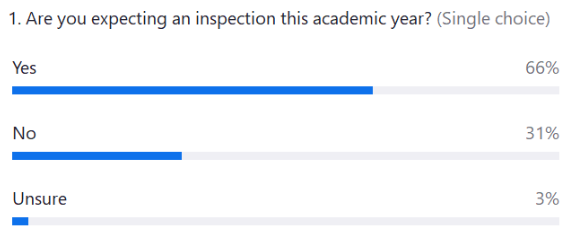
Getting the basics right
When discussing Ofsted inspections, it's helpful to ensure that we've got the basics covered.
Documentation
- Do you have a SEND Policy and Information Report on your website that has been ratified by your governors in the past year?
- Have you checked that the Information Report contains all it must? (There are no requirements for the contents of the policy)
These two points are a great starting point for engaging with SEND in your school. The policy should set out your aims and principles for supporting children with SEND; the information report details the implementation of this - it reflects practice.
While not part of the statutory guidance, it's also helpful for leaders to consider how SEND is reflected in the school development/improvement plan (SD/IP). From our experience conducting audits in primary and secondary schools around the country, the extent to which SEND features in the SDP sets the stage for the quality and depth of provision provided to students.
Other factors to consider
- Are you compliant in conducting your Annual Reviews?
- Once per year
- Information circulated with relevant parties at least 2 weeks prior to the meeting
- Minutes from the meeting sent afterwards
- Do you have individual learning plans (ILPs) in place for all children with EHCPs?
- Are all of your staff utilising these to inform their teaching and interactions with children?
- Do all parents/carers of children with SEND know they have SEND and are receiving support?
Reasonable adjustments
It's also worth thinking about whether you are making the necessary reasonable adjustments for children with SEND, under the Equality Act. It's important for you to be able to articulate how you're meeting the needs of all children with SEND, whether or not they have an EHCP.- Are appropriate safeguarding measures put in place for children with SEND?
- Are exam access arrangements in place for all years?
- Are children with SEND able to access clubs and trips? Have you audited this?
- Behaviour policy allows children with SEMH (e.g., ADHD) to thrive
Preparing for the call
You don't have to prepare anything. However, you might find it helpful to have:- Have chosen key students: range of E and K across years (let staff know who these children will be in advance so you can be confident their books will be in order)
- Printed copies of provision maps for key students
- A few case studies: examples of your systems working well (e.g., referrals, APDR, transition support)
- Have key data (attendance, exclusions, progress)
- Have examples of staff comms for the child
- Provision map for them
- Examples of work
Judicium can also help in this area - clients of our SEND Support service make use of our documentation reviews and templates to save themselves time and ensure they are compliant.
What areas do Ofsted consider when inspecting SEND provision?
Ofsted doesn't grade SEND separately: inspectors use what they've seen of your SEND provision to inform their judgements in other areas: the intent, implementation and impact of quality of education, behaviour and attitudes, personal development and leadership and management.
Poll 2
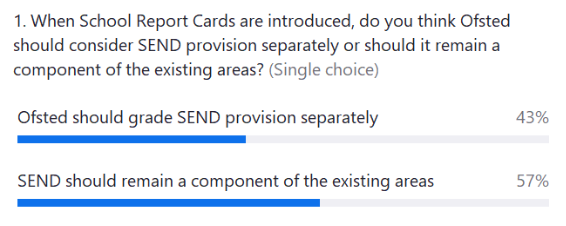
There are two main sources of information on what Ofsted are looking for with regards to SEND: the Education Inspection Framework and the School Inspection Handbook. What they say, in short, is:
- Schools must be aspirational for learners with SEND and this should be driven by the curriculum they offer
- Ofsted will want to see that children with SEND have access to the whole curriculum (and that this is worked towards even when they are offsite)
- That careful assessment and planning means it is impactful
- There is a robust and clear strategy for teaching reading
- Children with SEND receive the cultural capital they need to succeed in life (so think about your inclusive extra-curricular activities)
- Furthermore, bullying, child-on-child abuse and discrimination are not tolerated
- All leaders should be able to convey how they have achieved this
What do the reports focus on?
Over the summer, the Judicium team spent some time analysing Ofsted reports for schools judged to be Outstanding and Inadequate. We pulled out the comments inspectors made about the schools' SEND provision and categorised them into seven different areas:- Leadership (including governance)
- Curriculum
- Teaching & Learning
- Provision (including areas such as identification, assessment and monitoring)
- Enrichment
- Working with the community
- Reading
Outstanding schools
Poll 3
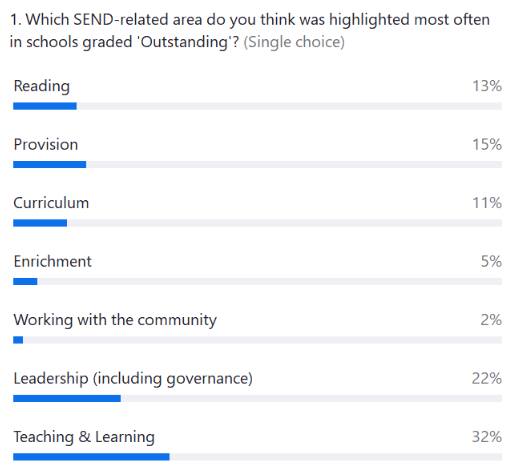
Curriculum, provision and teaching & learning (in that order) were the most common themes among inspectors' analysis of what contributed to a school's outstanding provision for children with SEND.
Curriculum
Examples
[This is copied from Ofsted’s School Inspection Handbook] Quality of Education - Outstanding:- Pupils with SEND achieve exceptionally well.
- Leaders adopt or construct a curriculum that is ambitious and designed to give all pupils, particularly disadvantaged pupils (including pupils with SEND), the knowledge and cultural capital they need to succeed in life. This is either the national curriculum or a curriculum of comparable breadth and ambition.
- The school has a well-planned curriculum that outlines essential knowledge and skills for all pupils, including those with SEND.
- Pupils with SEND receive necessary support in mainstream classes and follow the same ambitious curriculum as their peers.
- The curriculum is carefully adapted to meet the needs of all pupils, including those with SEND.
- A few pupils follow a bespoke curriculum tailored to their individual needs.
Advice
- Align SEND priorities with those of department heads or phase leads (e.g., vocabulary).
- Ask MLs who have effective strategies to present to whole staff.
Provision
Examples
- Knowledge of pupils and their families is extremely good.
- Leaders identify pupils with SEND through a whole-school referral system, including carefully checking what they know when they arrive.
- Where pupils are not attending school often enough, leaders are doing all they reasonably can: working with parents, outside agencies and mental health professionals
Advice
- Do you hold regular coffee mornings? These provide an excellent way for you to develop a partnership with parents.
- We can help with this too - later this term, on 14 November we are running a streamed coffee morning which you can advertise to your parents. We'll be covering the basics of SEND provision: what Early Help and the Local Offer are, how they can seek support in the community, how they can work closely with you to ensure the LA provides the support their child requires, among other topics - this paid for training will be available to book through our training page soon, alternatively, sign up to receive updates straight to your inbox.
iTeaching & Learning
Examples
- Teachers focus on ensuring pupils with SEND make excellent progress.
- Teaching is adapted effectively so that pupils with SEND can achieve their best, regardless of their starting points.
- Teachers receive the necessary information and training to support pupils with SEND effectively.
Advice
- Do all staff know which children have SEND? Do they know what strategies work for them and what their targets are? Briefings are effective for this.
- Offer a regular slot where staff can visit your SENDCO with concerns.
- Consider making a crib-sheet for staff that they can refer to in an inspection: school context, key questions they should have answers to, summary of your policy.
Poll 4
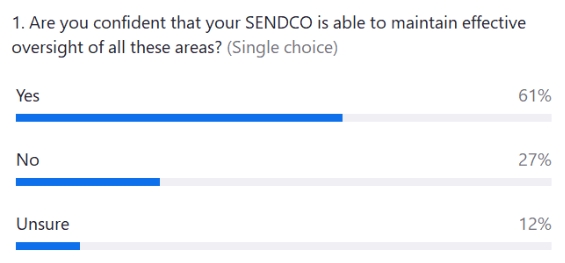
Inadequate schools
Poll 5
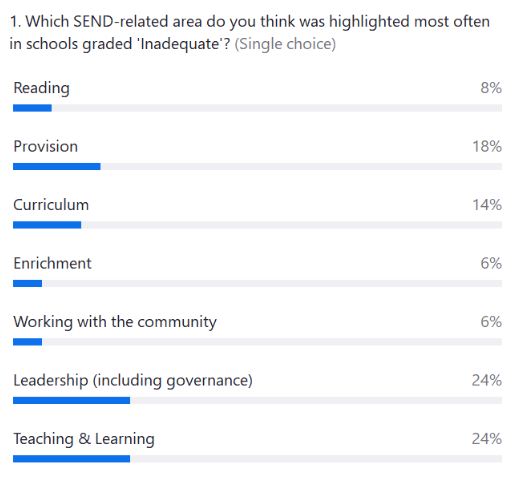
Leadership and provision came out as the most common SEND themes for schools judged to be inadequate. It's perhaps not surprising that schools judged to be inadequate have issues with their leadership but what it illustrates is that outstanding SEND provision cannot happen in isolation: it goes hand-in-hand with a coherent and well-implemented strategy for the school.
Leadership
Examples- Leaders have been too passive in monitoring the learning and achievement of children with SEND and have not ensured staff contribute effectively.
- Leaders have failed to identify, assess, and support the needs of children with SEND in both behaviour and learning.
- Governors have too readily accepted leaders’ reports and are unaware of the true extent of weaknesses affecting pupils’ achievement, especially those with SEND.
These findings are in line with what Ofsted define as Good and Outstanding for Leadership and management.
Leadership and management - Good:
Leaders have a clear and ambitious vision for providing high-quality education to all pupils. This is realised through strong, shared values, policies and practice.
Leadership and management - Outstanding:
Leaders ensure that teachers receive focused and highly effective professional development. Teachers’ subject, pedagogical and pedagogical content knowledge consistently build and develop over time. This consistently translates into improvements in the teaching of the curriculum.
AdviceSince Judicium's SEND service started last year, we have helped leaders around the country identify and work towards strategic goals for their SEND provision. We've worked with schools on:
- Developing their governor's SEND subject knowledge and, in turn, their ability to strategically analyse their school's provision.
- Meaningfully involving their SENDCO curriculum and teaching & learning leadership.
- Distributing the leadership of SEND through middle leaders.
- Developing their ability to effectively analyse SEND data and use this to drive change.
Early strategic goals for the 2024/25 academic year
Many schools around the country will be expecting Ofsted this year and will want to feel assured that their SEND provision enables a smooth inspection. Although Ofsted check our work, our ultimate goal is to ensure that we are working collaboratively with parents/carers to enable children with SEND to access a broad curriculum that prepares them for adult life.
Key areas of focus:
- Leadership of SEND - e.g., consider how your SEND priorities are tied into your existing SDP foci.
- Curriculum - e.g., distribute the leadership of SEND provision to curriculum leaders through training and monitoring.
- Provision - e.g., ensure that robust strategies for assessing, identifying and monitoring children are in place.
- Teaching & Learning - e.g., ensure that teachers are utilising clear individual learning plans to adapt their lessons for children with SEND.
Additional Info
If you are interested in some more live SEND training why don't you check out what else we have coming up here.
What do Ofsted Look for when Inspecting for SEND Provision and Leadership?
If you require any SEND support in any of these steps or would like to talk to someone surrounding our SEND Support Service for your school, please do not hesitate to call us on 0345 548 7000 or email georgina.decosta@judicium.com
You can follow us on Twitter: @JudiciumSG @JudiciumEDU
If you’d like to review all of Judicium’s forthcoming sofa sessions please click here
© This content is the exclusive property of Judicium Education. The works are intended to provide an overview of the sofa session you attend and/or to be a learning aid to assist you and your school. However, any redistribution or reproduction of part or all of the contents in any form is prohibited. You may not, except with our express written permission, distribute or exploit the content. Failure to follow this guidance may result in Judicium either preventing you with access to our sessions and/or follow up content.
Related content
.png)
This blog is based on Judicium’s Safeguarding ‘Sofa Session’ from the 9th of July, with our resident expert Rik Chilvers
.png)
This blog explores how school leaders can develop SEND provision; when the right strategies are applied, leadership teams can build inclusive, confident, and impactful SEND provision that benefits every pupil.
.png)
This blog is based on Judicium’s SEND ‘Sofa Session’ from the 21st of May, with our resident expert Rik Chilvers.
.png)
This blog is based on Judicium’s SEND ‘Sofa Session’ from the 26th of March, with our resident expert Rik Chilvers.

This blog is based on Judicium’s SEND ‘Sofa Session’ from the 11th of December, with our resident expert Rik Chilvers.

As the pressure on schools increases, we need to examine the current challenges and reflect on actions that ensure every child, regardless of their strengths and needs, has access to the education they deserve. The impact this is having on the whole school community is already apparent, but how do schools and academy trusts even begin to address this?

Sofa Sessions | SEND